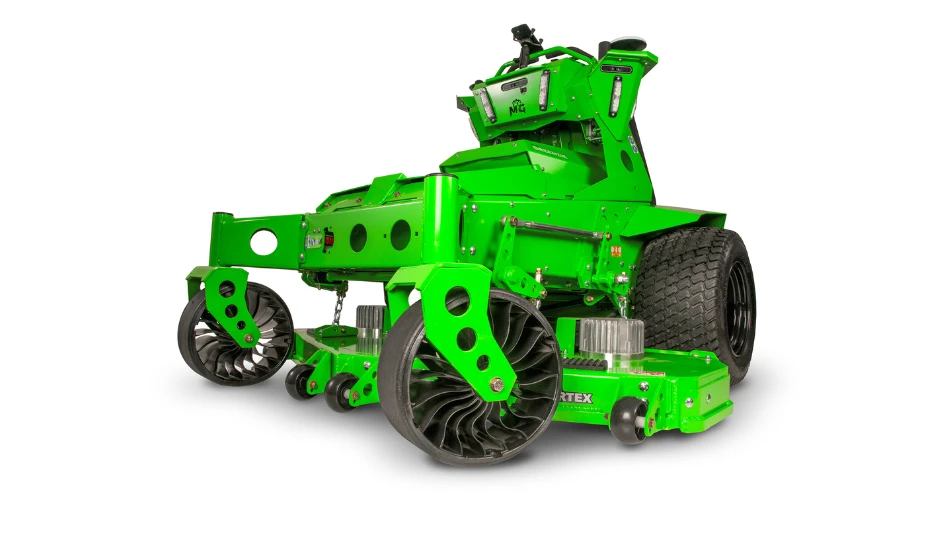
Ruppert Landscape ranked eighth this year in Lawn & Landscape's annual Top 100. The following is a feature on Ruppert's company culture.
How does a growing company preserve its culture so its spirit and mojo – the values that anchor the business – spread and perpetuate? How do you get big without losing who you are?
At Ruppert Landscape, maintaining its culture is a priority, and the 48-year old firm promoted one of its veteran leaders, Mike Monde, to the role of director of culture and procedures.
“It would be foolish to think that we are not going to change as we grow, but remembering who we are and passing that culture on to new leadership coming to the ranks is something we embrace,” says Monde, who started at Ruppert 19 years ago and progressed up operations ranks.
“As I grew in my role, I became embedded in our culture – I lived the values,” Monde says. “I built my career here through the culture Ruppert offers, and our vision is really quite simple. It’s to take care of our people, train and develop our people and take care of our customers. We recognize that without our customers, we don’t exist. So, we want to help our people do the right thing so we can take care of the clients we serve.”
Talking about culture and values is one thing. But continuing a tradition of service and instilling Ruppert Landscape’s procedures into new employees from the ground up – field to management – requires a commitment. Monde says this position sends a message to their people that they care about company culture. “We care about maintaining it. The fact that our company has made an investment in this role to build on our culture shows we are changing, and we are doing our best to maintain who we are and what helped get us here,” he says.
Passing on tradition
Ruppert Landscape started in 1971 when founders Craig and Chris Ruppert began operating out of their parents’ garage. The company grew to serve communities in Philadelphia and Atlanta before it was later sold in 1998. Then in 2003, the company returned to the industry with full-scale commercial landscape construction and landscape management divisions.
Ruppert Landscape is known for its procedures and for systemizing operations. In defining the culture, Monde says: “procedures, expectations and standards.”
“We are a company of procedures, absolutely,” he says. “We have a lot of them, we follow them, and we look to improve on them.”
Monde’s charge is to continue adopting Ruppert’s procedures–a key to its longevity and success. Training and development are key aspects of his role.
Ultimately, he’ll make sure the company’s secret sauce doesn’t get watered down with continued expansion. Amy Snyder, director of public relations, says evolving companies have changing needs.
“With all of our branches and the people being hired, it really does become much more critical to make sure your culture and values are scalable,” she says, adding that new colleagues do not have the benefit of 25 years in the Ruppert culture.
Meanwhile, Ruppert has expanded beyond landscaping and includes Ruppert Nurseries (founded in 1990) and Ruppert Properties (2000).
With about 1,600 employees and branches throughout Pennsylvania, Maryland, Washington D.C., Virginia, North Carolina, Georgia and Texas, Ruppert Landscape is one of the largest commercial landscape companies in the industry. Serving as the company’s minister of culture is no small feat. But Monde was the ideal fit, Snyder says. “The new position was created for Mike, actually,” she says. “We knew we had the right person for the job, and the key was to find a way to utilize his talents in a way that could help our company evolve and carry on the culture.”
Monde visits branches and shares his insight and experiences. “I meet with field employees and with our customers to make sure we are practicing the unique procedures and things we do, and that we are doing them well,” he says.
That means reinforcing the Ruppert can-do culture and empowering employees to make decisions that benefit customers and the company. It can include making a choice on a job site that will improve efficiency, or suggesting a charitable organization that could use Ruppert’s resources. Ruppert offers its people a broad base of ownership, incentive programs, extensive training and active community service programs. All this packaged with its operational procedures creates the Ruppert culture.
And, once employees embrace the culture, many hold on to it. The average tenure at Ruppert is 14 years within the ranks of branch and executive managers.
Monde and Snyder are testaments to this longevity.
“We walk the talk, and our people see that we are doing the right thing,” Monde says. “Demonstrating that makes people more committed to our values – there’s top-down and bottom-up support for what we’re doing.”
Keeping the culture strong
Ruppert’s culture focus and the creation of Monde’s position is also proving that a company can grow “small.” Traditionally, the company has held annual field day activities where its employees would meet in the Washington D.C. area to complete a charitable landscape renovation. Some years, about 700 Ruppert team members would join in on the effort.
But now, the company is shifting this single, national event to Ruppert’s individual markets. “We shifted from more of a corporate field day to regional initiatives that allow us to make a different in the communities we serve,” Monde says. “That way, people in our area branches can give back and feel a more personal involvement in the giving.”
Snyder says the company revamped the field day event to allow greater participation at a local level and enable those branches to work together to plan it. “We coached teams on how to do the event as a focused, 100-person event, while still remaining true to our tenets of training, competition and giving back,” she says, noting that Monde worked closely with Ruppert’s Georgia team to localize the first regional field day initiative.
Now, more people are involved in the field days, and the giving resonates with team members because they are making a direct, positive impact on the communities where they live, work and play. “That is a great example of the success we are having so far with passing down our values and culture,” Snyder says.
Preserving values
Before a company can implement a position like director of culture and procedures, the organization must embrace its vision and values to the core. “You have to be confident and secure in the culture of the company,” Monde says. “And leadership has to be committed to it. Culture is nothing but a word if the leadership isn’t living it and believing in it.”
Organizations that want to create a role like this should consider a leader who has experience in the business and “uses the values.” He says, “The individual has to embrace the culture and build upon it in order for the position to be successful.”
Snyder adds, “The culture of a company is co-owned by leadership and team members. You can’t just have a leader talk about doing something. Team members have to see that their leaders have integrity.”
Monde says when he started at Ruppert Landscape nearly two decades ago, he never could have foreseen the company’s growth but continued culture. “If you would have told me then that we’d be a $180 million company and I’d be the director of culture, I might have said, ‘You’re crazy.’ But here we are, and at this size, we are a company that is still maintaining our values and what we stand for.
“We always say, ‘We don’t want to be the biggest company, we want to be the best company,’” Monde continues. “I think we are striving hard to continue that mindset by staying true to our culture, living by our values and building this business the right way.
Latest from Lawn & Landscape
- Connect, Control & Conserve with Horizon Technical Services
- Use Horizon's Parts Hotline
- How I built a Top 100 company
- Horizon’s Exclusive TurfGro Fertilizer
- Grow your business with mosquito control
- LandCare adds 2 branches in SoCal, promotes Aleman to branch manager
- Spray them away
- PERC helps debut propane direct-injection fuel system at ACT Expo 2025






